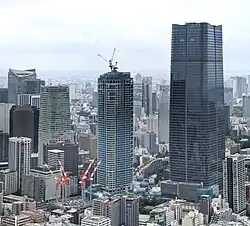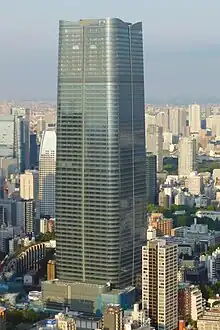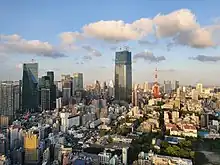Azabudai Hills
Azabudai Hills (麻布台ヒルズ, Azabudai Hiruzu), formerly tentatively known as the Toranomon-Azabudai District or Toranomon-Azabudai Project, is a complex of three skyscrapers complete in Tokyo, Japan. Upon its completion in 2023, the Azabudai Hills Mori JP Tower in the development became the tallest building in Tokyo and Japan.
| Azabudai Hills | |
|---|---|
麻布台ヒルズ | |
 Azabudai Hills in May 2023 | |
| Former names | Toranomon-Azabudai District Toranomon-Azabudai Project |
| Record height | |
| Tallest in Japan since 2023[I] | |
| Preceded by | Abeno Harukas |
| General information | |
| Status | Completed |
| Type | Mixed-use |
| Architectural style | Modern Neo-futurism |
| Location | Tokyo |
| Country | Japan |
| Coordinates | 35°39′38″N 139°44′25″E |
| Construction started | 2019 |
| Topped-out | April 2022 |
| Estimated completion | October 2023 |
| Cost | ¥580 billion ($4.4 billion) |
| Owner | Mori Building Company |
| Height | |
| Architectural | 325.2 m (1,067 ft) 262.8 m (862 ft) 237.2 m (778 ft) |
| Roof | 323.1 m (1,060 ft) |
| Top floor | 322 m (1,056 ft) |
| Technical details | |
| Structural system | Steel Reinforced concrete Concrete encased steel |
| Floor count | 64, 64, 54 |
| Floor area | 461,395 m2 (4,966,410 sq ft) |
| Design and construction | |
| Architect(s) | Pelli Clarke Pelli Architects Heatherwick Studio |
| Developer | Mori Building Company |
| Main contractor | Shimizu Corporation |
Designed by the architectural firm Pelli Clarke Pelli Architects and developed by the Mori Building Company, it is estimated that the project will cost about 580 billion yen ($4.4 billion). Construction started in 2019 and is expected to be completed in 2023.[1]
The complex is located in the Toranomon business district, in the ward of Minato; it lies between sister Mori Building projects Roppongi Hills to the west, Toranomon Hills to the east and Ark Hills to the north. The project's official name, "Azabudai Hills", was announced by Mori Building on 14 December 2022.[2]
Design

Azabudai Hills will consist of three buildings: Azabudai Hills Mori JP Tower, Azabudai Hills Residence A and Azabudai Hills Residence B.[3] Mori JP Tower, measuring 325.2 metres (1,067 ft) and featuring 64 floors, will be the first supertall to be built in Tokyo. Its appearance was designed to complement the nearby Ark Hills Sengokuyama Mori Tower, a project by the same architect and developer located 250 metres (820 ft) away. The two accompanying buildings, Residence A and Residence B, measure 237.2 and 262.8 metres (778 and 862 ft) in height and feature 54 and 64 floors.[4] The three skyscrapers were designed by Pelli Clarke Pelli Architects, the firm of Argentine architect César Pelli. Upon completion in 2023, the Azabudai Hills Mori JP Tower became the tallest building in Tokyo, surpassing the nearby Toranomon Hills Station Tower, as well as in Japan, surpassing Osaka's Abeno Harukas.[1][5]
Accompanying the skyscrapers are a series of low-rise buildings that plan to create a landscape pergola, designed by London-based Heatherwick Studio.[6] The 8.1-hectare (20-acre) area will be surrounded by lush greenery and will feature 24,000 m2 (260,000 sq ft) of green space, including a 6,000 m2 (65,000 sq ft) central square.[7][8] According to Mori, the design embodies the concept of a "modern urban village". Additionally, 9,000 m2 (97,000 sq ft) of cultural facilities will also be included.[9]
Usage

The project will have a total floor area of 860,400 m2 (9,261,000 sq ft),[1] including 213,900 m2 (2,302,000 sq ft) of office space and approximately 1,400 residential units.[9] The main building contains office space in lower and middle floors, while residential spaces will be located on the upper floors, from the 56th to the 65th floor.[10] The lower floors will also include a supermarket and a multi-language child care facility, as well as an international school, The British School in Tokyo.[7][11] It is projected that the complex will house offices for about 20,000 workers and residences for about 3,500 people.[9]
References
- Ravenscroft, Tom (27 August 2019). "Pelli Clarke Pelli reveals Japan's tallest skyscraper". Dezeen. Archived from the original on 23 May 2022. Retrieved 29 September 2022.
- "Mori Building debuts "Azabudai Hills" as official name of Toranomon-Azabudai Project, representing the "Hills of the future"" (PDF). Mori Building. 14 December 2022. Archived (PDF) from the original on 18 December 2022. Retrieved 18 December 2022.
- "麻布台ヒルズ Azabudai Hills" (in Japanese). Mori Building. Archived from the original on 24 January 2023. Retrieved 28 January 2023.
- "Toranomon-Azabudai District Complex". The Skyscraper Center. Council on Tall Buildings and Urban Habitat. Archived from the original on 30 June 2020. Retrieved 30 June 2020.
- Takahashi, Go (22 April 2022). "New skyscraper in Tokyo rises to dizzying 330 meters in the air". The Asahi Shimbun. Archived from the original on 4 June 2022. Retrieved 29 September 2022.
- Ravenscroft, Tom (22 August 2019). "Heatherwick Studio reveals designs for "gigantic planted pergola" in Tokyo". Dezeen. Archived from the original on 8 May 2020. Retrieved 30 June 2020.
- Nagata, Kazuaki (22 August 2019). "Mori unveils ¥580 billion project to bring record-breaking skyscraper and urban greenery to Tokyo". The Japan Times. Archived from the original on 2 July 2020. Retrieved 30 June 2020.
- Steen, Emma (30 August 2019). "Toranomon-Azabudai's urban transformation project includes Japan's tallest skyscaper". Time Out Tokyo. Archived from the original on 30 June 2020. Retrieved 30 June 2020.
- Staff Writers (26 August 2019). "Japan's Mori Building unveils US$5.5bn central Tokyo development". APAC Real Estate. Archived from the original on 30 June 2020. Retrieved 30 June 2020.
- "Redevelopment Plan for the Toranomon-Azabudai District". PLAZA HOMES. 30 January 2017. Archived from the original on 30 June 2020. Retrieved 30 June 2020.
- Barandy, Kat (22 February 2023). "Heatherwick Studio's first-ever school will take shape in Tokyo with cascading terraces". Designboom. Archived from the original on 29 March 2023. Retrieved 9 April 2023.